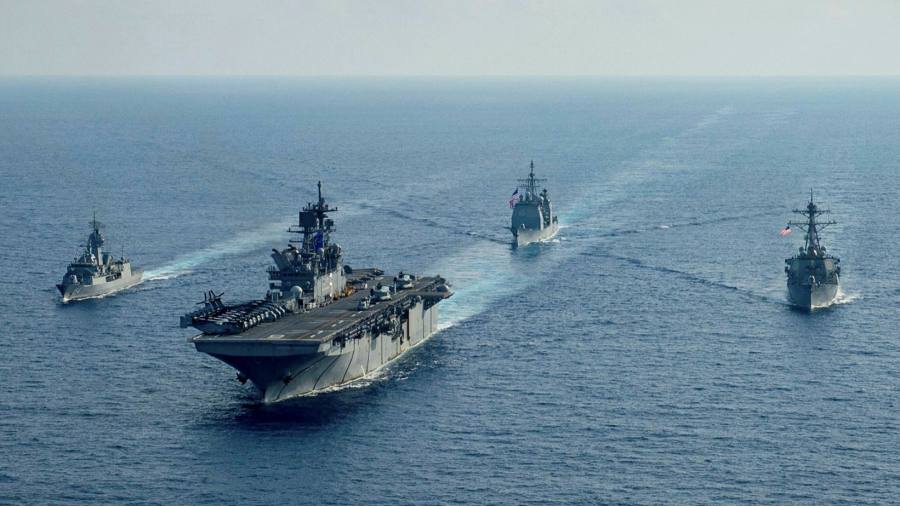The US has launched a new trilateral security partnership with the UK and Australia that will enable Canberra to build a fleet of nuclear-powered submarines, a move that will strengthen the allies’ ability to counter China.
President Joe Biden announced the effort, which is designed to bolster alliances amid rising tensions with China over disputes ranging from the South China Sea to Taiwan, in a virtual event on Wednesday evening with British prime minister Boris Johnson and his Australian counterpart Scott Morrison.
Biden said the initiative, including the submarine plan, was necessary to ensure the countries had the best technology to “defend against rapidly evolving threats”, in rhetoric that appeared to be aimed at Beijing.
“Our nations . . . have stood shoulder to shoulder for literally more than 100 years,” he said. “Today we’re taking another historic step to deepen and formalise co-operation . . . because we all recognise the imperative of ensuring peace and stability in the Indo-Pacific.”
A senior US official said that while Australia would acquire nuclear-propulsion technology — which the US has only shared with the UK — Canberra would not develop nuclear weapons. Biden also stressed that the submarines would not be armed with nuclear weapons.
The US official said the vessels would boost Australian naval capabilities because they were faster and more stealthy than conventional submarines. The submarines can also operate further from Australia, including in the South China Sea, and do not need to surface as frequently.
Morrison said the allies had to elevate their partnership to a “new level” because of the increasingly complex environment in Asia, another thinly veiled reference to China. Johnson said they were “opening a new chapter” and would work “hand in glove to preserve security and stability” in Asia.
The leaders said that in addition to helping Australia build a nuclear-powered submarine force, they would also boost co-operation in areas such as cyber security, artificial intelligence, and quantum computing.
One British official said the alliance would focus on maritime and defence technology, in contrast to the “Five Eyes” arrangement through which the US, UK, Australia, New Zealand and Canada share intelligence.
The US official said Biden did not tell China’s Xi Jinping about the initiative when the two leaders spoke last week. The new partnership — dubbed AUKUS — was formed a week before Biden is due to host the leaders of Japan, India and Australia for the first in-person summit of the “Quad”. The Quad security grouping is also designed to counter China and has been described by Beijing as an “Asian Nato”.
The Chinese embassy in Washington criticised Wednesday’s move, saying the US, UK and Australia should not build “exclusionary blocs targeting . . . the interests of third parties”.
“They should shake off their cold war mentality and ideological prejudice,” added Liu Pengyu, the embassy spokesperson.
Australian media said Canberra would end an existing $90bn programme to buy 12 French-designed conventional submarines. The official said the allies would decide over the next 18 months how to build the fleet.
“This is a fundamental decision that binds decisively Australia and the United States and Great Britain for generations,” the US official said.
The move elicited a blistering reaction from France. In a joint statement late on Wednesday, Jean-Yves Le Drian, the foreign minister, and Florence Parly, the defence minister, attacked Australia for acting “contrary to the letter and spirit of the co-operation that prevailed” between the two countries. Le Drian and Parly also accused the US of excluding “a European ally and partner from a structuring partnership with Australia, at a time when we are facing unprecedented challenges in the Indo-Pacific region”, saying it showed “a lack of coherence that France can only note and regret”.
“The regrettable decision . . . only reinforces the need to make the issue of European strategic autonomy loud and clear. There is no other credible way to defend our interests and our values in the world, including in the Indo-Pacific,” Le Drian and Parly added.
Kori Schake, head of foreign and defence policy at the American Enterprise Institute, said Wednesday’s deal would however send a strong signal to Beijing.
“It strikes me as an elegant message, a reminder to China that Australia has the technological capabilities and alliance relationships that they could become a nuclear power if the threat China poses becomes so severe”, Schake said. “It [is] also . . . a good moment for the Biden administration to demonstrate its commitment to the security of its allies after the debacle of the US withdrawal from Afghanistan.”
Richard Fontaine, head of the Center for a New American Security, said the submarines were a “big deal” that would not only give Australia better capabilities but would help Washington, particularly amid criticism that China is outpacing the US in building navy ships and submarines.
“The real measure of comparison is not China on one side and the US on the other. It’s China on the one side with the US and its allies on the other,” said Fontaine.
Additional reporting by James Politi in Washington
Follow Demetri Sevastopulo and Laura Hughes on Twitter


